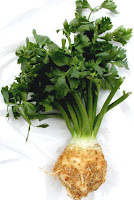Celery (Apium Graveolens)
 Description
Description
Usually, celery (Apium graveolens) is used in making salads, spicing up foods containing meat, etc. However, the roots, leaves and celery seeds are used for therapeutic purposes in treating and preventing diseases. In medicine, celery has been used as far back as Ancient Greece when it was highly valued for its properties as an aphrodisiac as well as its medicinal properties. Around the same time celery was also used as a decorative herb by the Romans, who used the leaves for their "Winner's Crown". In traditional medicine celery was used to eliminate intestinal parasites. Chinese medicine recommended celery to be used as a medicine to treat high blood pressure due to its stabilizing components. Apium graveolens initially grew on humid grounds of Europe and Asia. With the start of the 19th century, celery began to be grown in United States. Nowadays this vegetable is more commonly used in foods, due to the richness of its taste. It is also useful in stomach illnesses, rheumatism, obesity and diseases of the urinary bladder; celery keeps its therapeutic properties the best when it is consumed raw. Either used as a snack or as medicine, celery detoxifies the body, stimulates the nervous system and mineralizes the body.
Proprieties
One hundred grams of celery has an energetic value equal to 18 calories. It contains vitamins A, B1, B2, B6, C, E, K, PP and minerals such as iron, calcium, phosphorus, magnesium and zinc. Vitamin C contained by celery strengthens the immunologic system and at the same time makes the body more resistant against new diseases. Calcium, potassium and magnesium act towards the same goal, straightening the body. Along with magnesium, iron is effective in alleviating the effects of anemia. Celery has the ideal quantities of iron and magnesium to stop oncological diseases from progressing. This plant has diuretic properties and dichloridic effects which are useful in renal afflictions (like renal colic and renal lithiasis) and heart disorders. In this purpose celery root is used. Due to its depurative properties, the consumption of celery is recommended for individuals who have a fast paced lifestyle and are unable to maintain a healthy diet. Because of these properties - diuretic and depurative - celery is the ideal ingredient for diets based on weight-loss. Diets based on celery have energizing and fortifying effects on the body due to the stimulation of the renal glands, reduction of the stress hormone and decreasing of the heart rate. But celery also has hypoglycemic properties, which means it can be used in treating sugary diabetes. Other properties: expectorant, emollient (effective against bronchitis), it adjusts hormonal dysfunctions (dysmenorrhea, infertility, disorders caused by menopause, various forms of acne, allergic dermatosis); cicatrizing (good for wounds, scratches, ulcerations).
Treatments and mixtures
Celery is consumed as a diuretic and laxative by those who have urinary retentions or suffer from kidney illnesses; it is also efficient in cases of asthenia, hoarseness, rheumatism, icterus, gout, arthritis, inflammations, dermatosis, diabetes, and obesity. Individuals with high cholesterol should add celery to their diets. Moreover, celery is effective for those who have lack of food appetite. Below are some mixtures based on celery.
Infusion of celery powder
To prepare the infusion, four spoonfuls of celery powder are put in 1 liter of boiling water. After that, the mixture is passed through a sieve and 1 cup of it a day is consumed to treat hoarseness, intestinal gases or for its laxative/diuretic properties. The infusion made from boiling two spoonfuls of grained celery stimulates the central nervous system. The infusion is taken daily in small amounts. If in one glass of cold water a spoonful of grained celery root is left to macerate, the resulting mixture taken before each meal treats anorexia. The infusion needs to be renewed each day.
Celery decoct
Twenty five grams of celery boiled in 1 liter of water are sufficient in preparing the mixture. The resulting decoct is taken in small quantities and is efficient against rheumatism, cough and hoarseness. A more concentrated decoct (containing between 30 and 40 grams of celery root in 1 liter of water) has a diuretic and depurative effect, treating slow digestions, obesity, gout, rheumatism.
Celery juice
Celery juice is excellent in treating rheumatism, allergies, stomach disorders, eliminating toxins, stimulating digestion and food appetite, adjusting sexual functions (treats frigidity and impotence) and is known as an all-round aphrodisiac. The ideal dosage in which it should be consumed is 3 glasses a day.
Warning
For pregnant women the consumption of celery should be made in very small quantities. Celery can cause in very rare cases allergic reactions to some individuals (cases which occurred in Central Europe).


0 komentar:
Posting Komentar